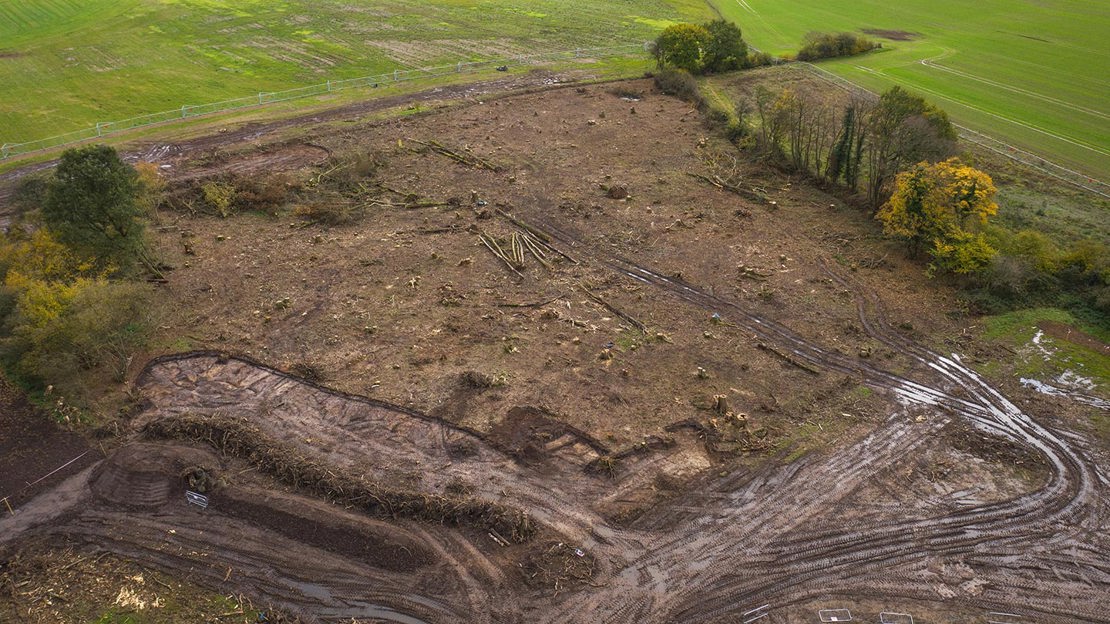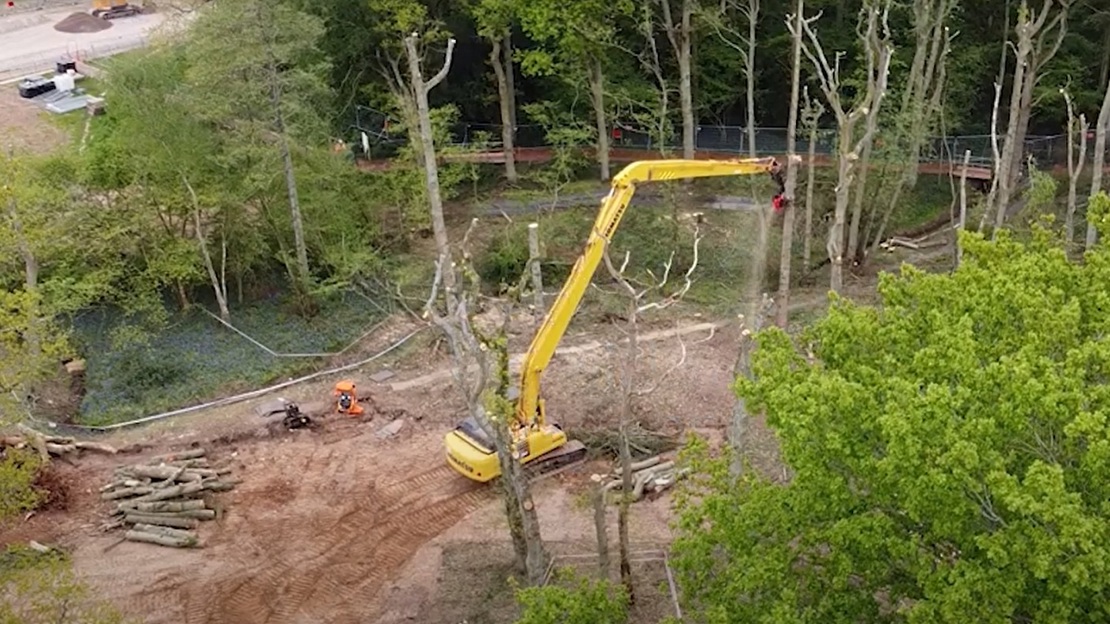The future of HS2 has changed. The initial scaling back of the Eastern Leg on Phase 2b in 2021 was followed by Government's October 2023 announcement that scrapped the whole HS2 route from Birmingham northwards. While this cancellation will save dozens of ancient woods and veteran trees from harm, it also brings into question the need for the HS2 scheme without the northern connections. We’re also concerned about the transport projects proposed as alternatives.
HS2 rail link
HS2 has long been a grave threat to the UK’s ancient woods and veteran trees, with many at risk of loss or damage. The destruction has already begun but we’re doing everything we can to save as many woods as possible.

For the past decade, ancient woods and trees across the country have been facing the axe to make way for HS2, the Government’s proposed high speed train line.
Along the Phase 1 section of the route from London to Birmingham, HS2 Ltd has damaged and destroyed ancient woods and veteran trees. With your support we’re continuing to work hard to prevent more of these precious wildlife havens facing the same fate as the scheme progresses and construction continues. By standing up for these irreplaceable habitats, we’ve made sure that ancient woods and veteran trees remain at the forefront of considerations for HS2 Ltd.
HS2 impacts woods and trees both where the railway lies and through all the associated development, like realignment of local roads and utilities. Impacts can be direct loss of trees and ancient woodland soils as well as indirect such as fragmentation, pollution and disturbance.
Phase 1: a story of destruction
We remain highly concerned about Phase 1’s impact on ancient woods. The entire HS2 scheme previously threatened 108 ancient woods. Now recalculated after major amendments to the scheme and the adding of previously unmapped sites to the Ancient Woodland Inventory, 55 ancient woods across the Phase 1 route will suffer direct loss or harmful indirect effects.
Since Phase 1 was given Royal Assent in 2017, we’ve worked behind the scenes to influence change wherever possible. With your help, we’ve tirelessly campaigned, lobbied and petitioned Government and argued that HS2 Ltd should first avoid and, if not possible, minimise damage to ancient woods and trees, and the species that depend on them. It has taken heed of some of our concerns and losses have been reduced by around a third. But approximately 20 hectares has already been felled, and not always in line with best practice and its own assurances to aim to minimise damage.
Broadwells Wood in Warwickshire is just one example. It was removed in April 2020 against all professional guidance and HS2’s own commitments to do the work in late autumn, when the woods would be dormant and wildlife less likely to be impacted. The loss of irreplaceable habitats like these is devastating for the people who love these special places and for the plants, fungi and animals that live there. Such destruction is entirely unacceptable.
If works are happening near you that affect ancient woodland, let us know using our report a threat form.

See us give evidence on Parliamentlive.tv when Phase 2a was debated in parliament.
Phase 2a: cancelled
The Phase 2a Bill was given Royal Assent – permission for works to begin – in 2021. In 2022, ground preparation was paused and construction delayed for two years due to rising costs, before being cancelled entirely in 2023. All woods along this section, set to run from Lichfield to Crewe, appear to now be safe from harm.
In early 2021 we were successful in amending legislation to legally require HS2 Ltd to report on its ancient woodland impacts across the entire project. This transparency is vital. However, when HS2 Ltd published its report in 2022 it contained little new information. We’ll keep pushing for greater transparency to ensure the public can hold HS2 Ltd to account.
Among the habitats saved by Phase 2a's cancellation is Whitmore Wood, Staffordshire. At 5.5 hectares, it was set to be the single biggest loss of ancient woodland on the proposed route.
Phase 2b: cancelled
In 2022, nearly 6,000 of you responded to Government’s consultation on Phase 2b to save ancient woods and veteran trees on this stretch of the line. But HS2 Ltd only published its ancient woodland strategy for this phase after the consultation closed, again demonstrating lack of transparency. The measures it proposed to compensate for ancient woodland loss fall well short of best practice and Natural England advice.
Shortly before cancellation of Phase 2b, we were preparing to contribute to the Parliamentary process for this scheme, including appearances before the House of Commons and House of Lords.
We had made some headway on ancient woodland losses, but it was apparent that HS2 Ltd would still not take responsibility for the plethora of indirect impacts the scheme will have on ancient woods, veteran trees and their wildlife.
Key successes so far
Though there's still a way to go, our successes so far include:
- influencing MPs to support a tunnel extension in the Chilterns, saving over nine hectares of ancient woodland
- helping to reduce loss of ancient woodland on Phase 1 by almost a third
- persuading HS2 Ltd to remove temporary works, such as construction compounds and stockpiles, from ancient woodland
- convincing HS2 Ltd to examine the impacts of the scheme not just on ancient woods, but also ancient and veteran trees, and potential unmapped areas of ancient woodland
- halting enabling works in 11 ancient woods due to be affected by Phase 1 during the 2019-20 Oakervee Review into if and how the scheme should proceed
- saving a total of 14ha of ancient woodland - the size of 19 football pitches.
What’s next for HS2?
The cancellation of Phases 2a and 2b was announced alongside a new policy paper from Government, known as Network North. This paper outlines how the £36 billion budget saved from HS2 can fund other transport projects up and down the country, with a focus on the North and Midlands. The number of schemes proposed is significant and we are currently working to understand how this change in direction will impact ancient woods and trees across England. Right now, we are certainly concerned.
Northern Powerhouse Rail (NPR)
In 2021, Government committed to building a new high speed line joining Liverpool, Manchester and Hull, delivered by HS2 Ltd and Network Rail. Plans are still in the early stages, but this project has the potential to threaten yet more ancient woods and veteran trees. Government must learn from its past mistakes and ensure future projects, including NPR, don't destroy our irreplaceable habitats. We’ll be keeping a close eye on further developments.
While we’re in favour of green transport and not against high speed rail projects in principle, we continue to strongly oppose the HS2 route. Its impact on ancient woods and veteran trees across the English landscape is wholly unacceptable. Any transport system that destroys irreplaceable habitats like ancient woodland can never be called 'green'.

